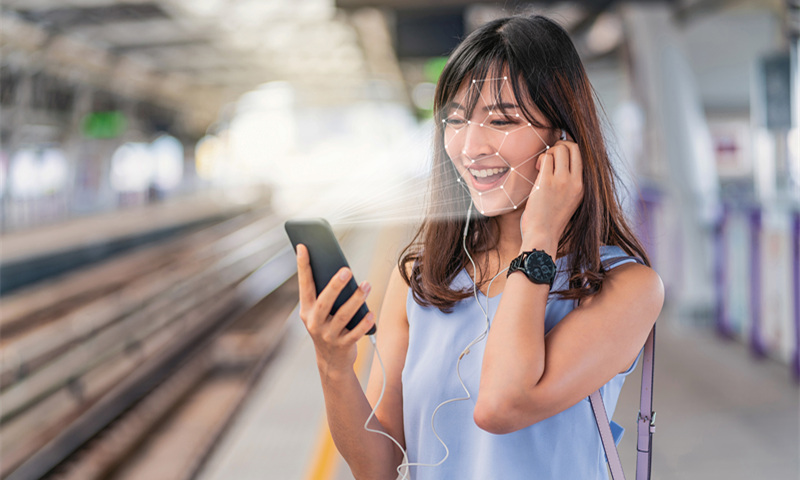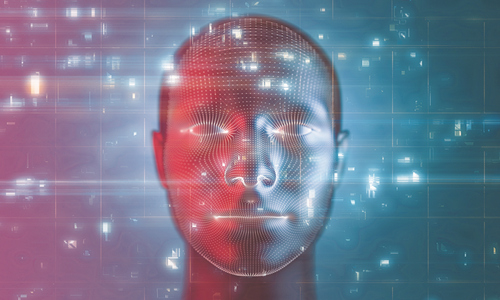Rite Aid privacy snafu; US chain used facial recognition tech in hundreds of stores
By Reuters - Global Times Source: Reuters-Global Times Published: 2020/7/30 16:43:41
US chain used facial recognition tech in hundreds of stores

Facial recognition Illustration: VCG
Over about eight years, US drugstore chain Rite Aid Corp quietly added facial recognition systems to 200 stores across the US, in one of the largest rollouts of such technology among retailers in the country, a Reuters investigation found.
For more than a year, the retailer used state-of-the-art facial recognition technology from a company with links to China.
In telephone and email exchanges with Reuters since February, Rite Aid confirmed the existence and breadth of its facial recognition program but defended the technology's use. Reuters found no evidence that Rite Aid's data was sent to China.
Last week, however, after Reuters sent its findings to the retailer, Rite Aid said it had quit using its facial recognition software. It later said all the cameras had been turned off.
While Rite Aid declined to disclose which locations used the technology, Reuters found facial recognition cameras at 33 of the 75 Rite Aid shops in Manhattan and the central Los Angeles metropolitan area during one or more visits from October through July. The company operates about 2,400 stores around the country.
The cameras matched facial images of customers entering a store to those of people Rite Aid previously observed engaging in potential criminal activity, causing an alert to be sent to security agents' smartphones. Agents then reviewed the match for accuracy and could tell the customer to leave.
Rite Aid told Reuters in a February statement that customers had been apprised of the technology through "signage" at the shops, as well as in a written policy posted this year on its website. Reporters found no notice of the surveillance in more than a third of the stores they visited with the facial recognition cameras.
Among the 75 stores Reuters visited, those in more impoverished areas were nearly three times as likely as those in richer areas to have facial recognition cameras.
In areas where people of color, including Black or Latino residents, made up the largest racial or ethnic group, Reuters found that stores were more than three times as likely to have the technology.
Reuters' findings illustrate "the dire need for a national conversation about privacy, consumer education, transparency, and the need to safeguard the Constitutional rights of Americans," said Carolyn Maloney, the Democratic chairwoman of the House oversight committee.
'Tougher' neighborhoods
10 current and former Rite Aid loss prevention agents told Reuters that the system they initially used in stores was from a company called FaceFirst, which has been backed by US investment firms.
It regularly misidentified people, all 10 of them said.
"It doesn't pick up Black people well," one loss prevention staffer said last year while using FaceFirst at a Rite Aid in an African-American neighborhood of Detroit.
FaceFirst's chief executive, Peter Trepp, said facial recognition generally works well irrespective of skin tone. He declined to talk about Rite Aid, saying he would not discuss any possible clients.
Rite Aid originally piloted FaceFirst at a store in a largely Asian and Latino neighborhood in Los Angeles around 2012.
Of the 65 stores the retailer targeted in its first big rollout, 52 were in areas where the largest group was Black or Latino, according to Reuters' analysis of a Rite Aid planning document from 2013 that was read aloud to a reporter by someone with access to it. Reuters confirmed that some of these stores later deployed the technology but did not confirm its presence at every location on the list.
Separately, two former Rite Aid managers and a third source familiar with the FaceFirst rollout said the systems were concentrated, respectively, in the "tougher," "toughest" or "worst" areas.
Starting in 2013, as Rite Aid deployed FaceFirst's technology in Philadelphia, Baltimore and beyond, some serious drawbacks emerged, current and former security agents and managers told Reuters.
FaceFirst's Trepp said the company has high accuracy rates while running "over 12 trillion comparisons per day without any known complaints to date."
At one store Reuters visited, a security agent scrolled through FaceFirst "alerts" showing a number of cases in which faces were obviously mismatched, including a Black man mixed up with someone who was Asian.
Generally, Trepp said, Reuters' findings about his company contained "extensive factual inaccuracies" and are "not based upon information from credible sources."

Facial recognition Illustration: VCG
A new system
Early in 2018, Rite Aid began installing technology from DeepCam LLC, ultimately phasing out FaceFirst in stores around the country, interviews with Rite Aid loss prevention agents and internal vendor documents indicate.
Six security staffers who used both systems said DeepCam's matches were more accurate - sometimes to a fault. The technology picked up faces from ads on buses or pictures on T-shirts, three said.
When agents saw someone commit a crime - or just do something suspicious, one said - they scrolled through recorded profiles on their smartphones to search for the individual, only adding the person to the watch list with a manager's approval, agents told Reuters.
Rite Aid said adding customers to the watch list was based on "multiple layers of meaningful human review." The company told Reuters its procedures ensured customers were not confronted unnecessarily.
If a person was found to be engaging in criminal behavior, Rite Aid said, "We retain the data as a matter of policy to cooperate in pending or potential criminal investigations."
Newspaper headline: Rite Aid privacy snafu
Posted in: INDUSTRIES